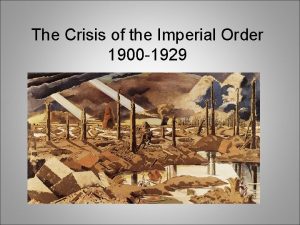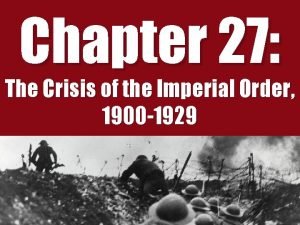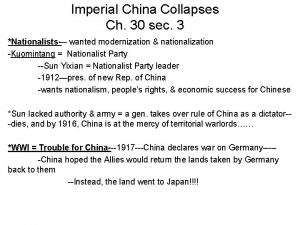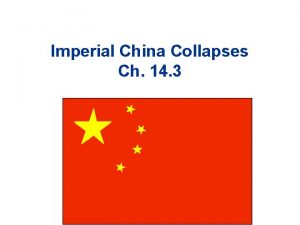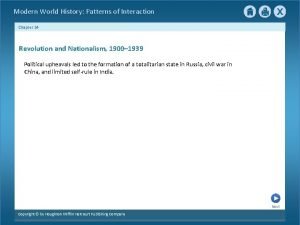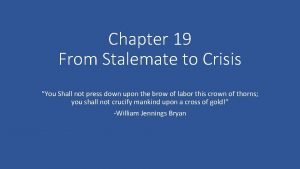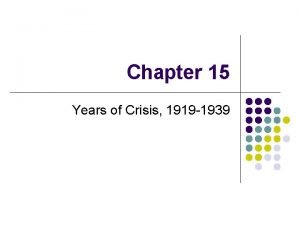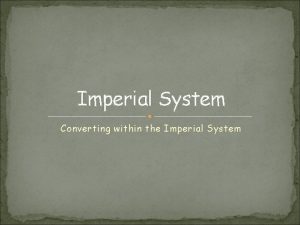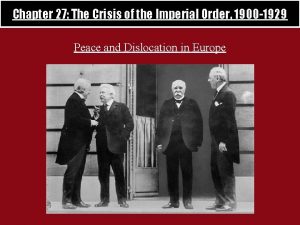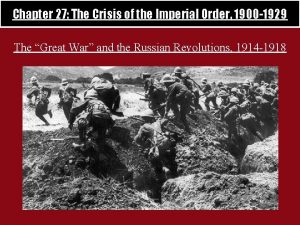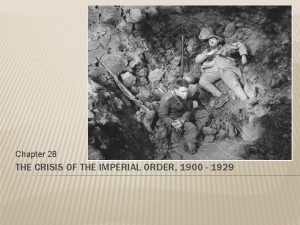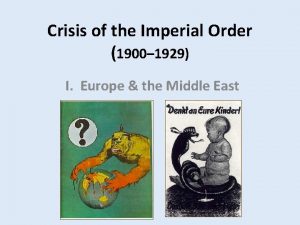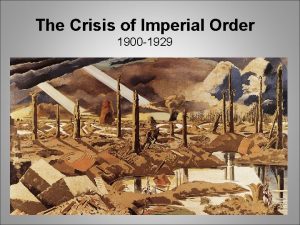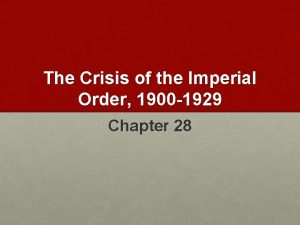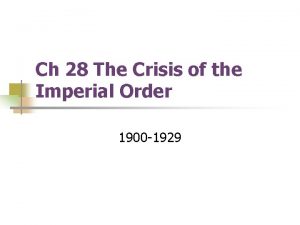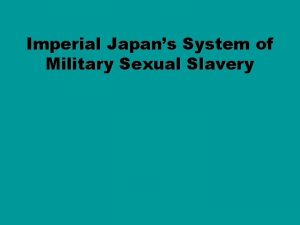Chapter 27 The Crisis of the Imperial Order
















- Slides: 16

Chapter 27: The Crisis of the Imperial Order, 1900 -1929

Chapter 27: The Crisis of the Imperial Order, 1900 -1929 Origins of the Crisis in Europe and the Middle East

Chapter 27: The Crisis of the Imperial Order, 1900 -1929 The Ottoman Empire and the Balkans The Ottoman Empire was the “sick man of Europe” because it was no longer rich or powerful The empire began losing provinces like Bosnia, Albania, Serbia, Bulgaria, and Romania “Young Turks” wanted to reform their empire and blamed Sultan Abdul Hamid for the country’s issues, placing his brother in power The empire then looked to Germany as a model for industrialization and modernization

Chapter 27: The Crisis of the Imperial Order, 1900 -1929 Nationalism, Alliance, and Military Strategy The assassination of the Archduke Franz Ferdinand triggered a chain of events over which military and political leaders lost control The escalation from assassination to global war had causes that went back many years

Chapter 27: The Crisis of the Imperial Order, 1900 -1929 Three reasons for this escalation Nationalism bound citizens to their ethnic group and called upon them to kill their enemies “Entangling alliances” linked nations together and guaranteeing that, if one went to war, the other would as well Germany’s desire to dominate Europe

Chapter 27: The Crisis of the Imperial Order, 1900 -1929 Because of nationalism, people viewed war as a crusade for liberty or as a long-overdue revenge for past injustices

Chapter 27: The Crisis of the Imperial Order, 1900 -1929 Over the course of the 19 th century the memories of the Napoleonic Wars faded and people began to forget when a continent wide military struggle really meant Conflicts such as the Franco-Prussian war were short and low on casualties In the wars of New Imperialism, Europeans were almost always victorious and experienced very few casualties

Chapter 27: The Crisis of the Imperial Order, 1900 -1929 Central Powers Germany Austria-Hungary Ottoman Empire Entente Powers Russia France Great Britain U. S. A. (1917)

Chapter 27: The Crisis of the Imperial Order, 1900 -1929

Chapter 27: The Crisis of the Imperial Order, 1900 -1929

Chapter 27: The Crisis of the Imperial Order, 1900 -1929

Chapter 27: The Crisis of the Imperial Order, 1900 -1929

Chapter 27: The Crisis of the Imperial Order, 1900 -1929 The alliance system was cursed by inflexible military planning These nations had developed massive railroad networks but very few motor vehicles This meant that the precise movements of troops and supplies had to be made well in advance and that it could not be stopped once it began

Chapter 27: The Crisis of the Imperial Order, 1900 -1929 In the years before the war, military planners in France and Germany had worked out elaborate railroad timetables to mobilize their armies in a matter of days German planners believed that Britain would not join a war on the European mainland Their plan was to defeat France in a matter of days and then move their entire army by rail to the Russian border before the Russian army could mobilize

Chapter 27: The Crisis of the Imperial Order, 1900 -1929 On July 28 th, 1914 Austria-Hungary declared war on Serbia, with the backing of Germany This event triggered the mobilizations plans of Russia, France and Germany On July 29 th, Russia ordered Austria to back down because Serbia was their ally On August 1 st, France honored its treaty obligation with Russia and ordered the mobilization of their army Minutes later, Germany did the same and war was inevitable

Chapter 27: The Crisis of the Imperial Order, 1900 -1929 The German war plan was to wheel around through Belgium, and into Northwest France The German leadership expected France to surrender before the British could get involved However, on August 3 rd, when German troops entered Belgium, Britain demanded their withdrawal When Germany refused, Britain declared war on Germany
 Chapter 27 the crisis of the imperial order
Chapter 27 the crisis of the imperial order Chapter 27 the crisis of the imperial order
Chapter 27 the crisis of the imperial order Myasthenic crisis vs cholinergic crisis ppt
Myasthenic crisis vs cholinergic crisis ppt Imperial jewelers is considering a special order for
Imperial jewelers is considering a special order for 1st order 2nd order 3rd order neurons
1st order 2nd order 3rd order neurons Chapter 30 section 3 imperial china collapses
Chapter 30 section 3 imperial china collapses Imperial china collapses chapter 14 section 3
Imperial china collapses chapter 14 section 3 Chapter 14 section 3 imperial china collapses
Chapter 14 section 3 imperial china collapses Chapter 26 crisis and disaster
Chapter 26 crisis and disaster Chapter 19 from stalemate to crisis
Chapter 19 from stalemate to crisis Chapter 26 civilizations in crisis the ottoman empire
Chapter 26 civilizations in crisis the ottoman empire Chapter 15 years of crisis
Chapter 15 years of crisis Countries that use imperial units
Countries that use imperial units Cms imperial
Cms imperial Metric measurements
Metric measurements Examples of imperial units
Examples of imperial units Medlearn imperial
Medlearn imperial
